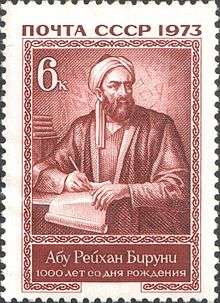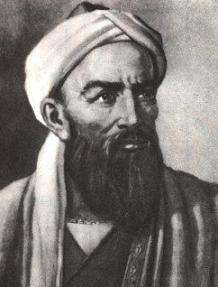
Al Biruni on a 1973 sovietic post stamp.

Illustration from al-Biruni's astronomical works, explains the different phases of the moon.
.jpg)

Abū Rayḥān Muḥammad ibn Aḥmad al-Bīrūnī (September 15, 973 – December 13, 1048) was a Persian polymath, scientist, physicist, anthropologist, psychologist, astronomer, chemist, critic of alchemy and astrology, encyclopedist, historian, geographer, traveller, geodesist, geologist, pharmacist, philosopher, theologian, scholar and teacher, and he contributed greatly to all of these fields.
Quotes
- Once a sage asked why scholars always flock to the doors of the rich, whilst the rich are not inclined to call at the doors of scholars. "The scholars" he answered, "are well aware of the use of money, but the rich are ignorant of the nobility of science".
- Quoted in: A.L. Mackay Dictionary of Scientific Quotations (London 1994).
- You well know … for which reason I began searching for a number of demonstrations proving a statement due to the ancient Greeks … and which passion I felt for the subject … so that you reproached me my preoccupation with these chapters of geometry, not knowing the true essence of these subjects, which consists precisely in going in each matter beyond what is necessary. … Whatever way he [the geometer] may go, through exercise will he be lifted from the physical to the divine teachings, which are little accessible because of the difficulty to understand their meaning … and because the circumstance that not everybody is able to have a conception of them, especially not the one who turns away from the art of demonstration.
- Book on the Finding of Chords.
- I have seen the astrolabe called Zuraqi invented by Abu Sa'id Sijzi. I liked it very much and praised him a great deal, as it is based on the idea entertained by some to the effect that the motion we see is due to the Earth's movement and not to that of the sky. By my life, it is a problem difficult of solution and refutation. [...] For it is the same whether you take it that the Earth is in motion or the sky. For, in both cases, it does not affect the Astronomical Science. It is just for the physicist to see if it is possible to refute it.
- [citation needed]
From Alberuni's India
- A famous idol of theirs was that of Multan, dedicated to the sun. When Muhammad Ibn Alkasim Ibn Almunabbih, conquered Multan, he inquired how the town had become so very flourishing and so many treasures had there been accumulated, and then he found out that this idol was the cause, for there came pilgrims from all sides to visit it. Therefore he thought to build a mosque at the same place where the temple once stood. When then the Karmatians occupied Multan, Jalam Ibn Shaiban, the usurper, broke the idol into pieces and killed its priests. When afterwards the blessed Prince Mahmud swept away their rule from those countries, he made again the old mosque the place of the Friday-worship.
- Alberuni in his India, Alberuni's India, Edward C. Sachau (translator and editor)
- The linga he raised was the stone of Somnath, for soma means the moon and natha means master, so that the whole word means master of the moon. The image was destroyed by the Prince Mahmud, may God be merciful to him! - AH 416. He ordered the upper part to be broken and the remainder to be transported to his residence, Ghaznin, with all its coverings and trappings of gold, jewels, and embroidered garments. Part of it has been thrown into the hippodrome of the town, together with the Cakrasvamin, an idol of bronze, that had been brought from Taneshar. Another part of the idol from Somanath lies before the door of the mosque of Ghaznin, on which people rub their feet to clean them from dirt and wet.
- E.C. Sachau (tr.), Alberuni's India, New Delhi Reprint, 1983
- The city of Taneshar is highly venerated by Hindus. The idol of that place is called Cakrasvamin, i.e. the owner of the cakra, a weapon which we have already described. It is of bronze, and is nearly the size of a man. It is now lying in the hippodrome in Ghazna, together with the Lord of Somanath, which is a representation of the penis of Mahadeva, called Linga.
- E.C. Sachau (tr.), Alberuni's India, New Delhi Reprint, 1983 p. 117.
- Mahmud utterly ruined the prosperity of the country, and performed there wonderful exploits, by which the Hindus became like atoms of dust scattered in all directions, and like a tale of old in the mouth of the people. Their scattered remains cherish, of course, the most inveterate aversion towards all Muslims.... Hindu sciences have retired far away from those parts of the country conquered by us, and have fled to places which our hand cannot yet reach, to Kashmir, Benaras and other places. And there the antagonism between them (the Hindus) and all foreigners receives more and more nourishment both from political and religious sources
- Alberuni's India, vol. I, p. 22. Also quoted (in part) in Jain, Meenakshi (2011). The India they saw: Foreign accounts.
- The Hindus do not pay particular attention to alchemy, but no nation is entirely free from it, and one nation has more bias for it than another, which must not be construed as proving intelligence or ignorance; for we find that many intelligent people are entirely given to alchemy, whilst ignorant people ridicule the art and its adepts.
- Alberuni, quoted from Lal, K. S. (1992). The legacy of Muslim rule in India. New Delhi: Aditya Prakashan. Chapter 1
- The Hindus believe that there is no country but theirs. no nation like theirs, no king like theirs, no religion like theirs, no science like theirs.
- Alberuni, I, p.22. quoted from K.S. Lal, Indian Muslims who are they, 1990
- They (the Hindus) differ from us in religion… There is very little disputing about theological topics among themselves; at the most they fight with words, but they will never stake their soul or body or their property on religious controversy. ... in all manners and usages they differ from us to such a degree as to frighten their children with us… and as to declare us to be devil’s breed and our doings as the very opposite of all that is good and proper, ....they call all foreigners as mleccha, i.e. impure, and forbid having any connection with them, be it by intermarriage or any other kind of relationship, or by sitting, eating, and drinking with them, because thereby they think, they would be polluted… They are not allowed to receive anybody who does not belong to them, even if he wished it, or was inclined to their religion.
- Alberuni, I, pp.19-20. quoted from K.S. Lal, Indian Muslims who are they, 1990
- “Its (Rasayan’s) principles (certain operations, drugs and compound medicines, most of which are taken from plants) restore the health… and give back youth to fading old age… white hair becomes black again, the keenness of the senses is restored as well as the capacity for juvenile agility, and even for co-habitation, and the life of the people in this world is even extended to a long period.”
About Al-Biruni
- "A Persian by birth, Biruni produced his writings in Arabic, though he knew, besides Persian, no less than four other languages."
- Rahman Habib A Chronology of Islamic History, 570-1000 CE, Mansell Publishing, p. 167:
- A Persian by birth, a rationalist in disposition, this contemporary of Avicenna and Alhazen not only studied history, philosophy, and geography in depth, but wrote one of the most comprehensive of Muslim astronomical treatises, the Qanun Al-Masu'di.
- David C. Lindberg, Science in the Middle Ages, University of Chicago Press, p. 18:
- Biruni, a scholar in many disciplines - from linguistics to mineralogy - and perhaps medieval Uzbekistan's most universal genius.
- Koïchiro Matsuura. (13 September 2000) United Nations: Educational, Scientific and Cultural Organization.
- The best foreign account of India that this age produced was written by Abu Rlhan, better known as Alberuni, a contemporary of Sultan Mahmud of Ghazni. While the ruthless conqueror was harrying India by fire and sword, destroying and plundering its cities and temples, the great Arabic scholar engaged himself in studying the culture and civilization of the country. He learned Sanskrit and studied its different branches of literature. The bulky volume which he wrote is in many respects the most rational and comprehensive account of India ever written by a foreigner until modern times. He is singularly free from religious enthusiasm, bordering on fanaticism, and the racial superiority-complex which mark the Muslim writings of the age. He patiently laboured to acquire knowledge of Indian society and culture in a laudabile spirit of quest for truth, and brought to his task a liberal and rational mind enriched by profound knowledge, remarkable for his age.
- [Al-Biruni's book] is like a magic island of quiet, impartial research in the midst of a world of clashing swords, burning towns, and plundered temples... Al-Biruni, the first scientific Indologist and one of the greatest of all times... If humanity, not religion, is to triumph in the world the study of comparative religion should start from where Al-Biruni had left it.... He stands unique in his age... - the most cosmopolitan or international scholar in the truest sense of the term.
- Mohammad Yasin, Reading in Indian History, Atlantic Publishers & Distri, 1988
External links
This article is issued from
Wikiquote.
The text is licensed under Creative
Commons - Attribution - Sharealike.
Additional terms may apply for the media files.